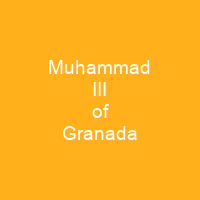Muhammad III was the ruler of the Emirate of Granada in Al-Andalus from 8 April 1302 until 14 March 1309. He ascended the throne after the death of his father Muhammad II. He was responsible for the construction of the Great Mosque of the Alhambra as well as the Partal Palace. His reign was notably short; he was replaced by his half-brother Nasr on 14 March 1300. Muhammad was later executed five years later in the alhambra.
About Muhammad III of Granada in brief

Muhammad III inherited an on-going war against Castile. He negotiated a treaty with Castile the following year, in which Granada’s conquests were recognised in return for Muhammad making an oath of fealty to the King of Castille, Ferdinand IV, paying him tribute. He sought to extend his rule to Ceuta, North Africa. To achieve this, he first encouraged the city to rebel against its Marinid rulers in 1304, and then, two years later, he invaded and conquered the city himself. Granada controlled both sides of the Strait of Gibraltar, which alarmed its larger neighbours, Castile, the Marinids, and Aragon, who by the end of 1308 had formed a coalition against Granada. The three powers were in the midst of preparing for an all-out war against GranADA when Muhammad was deposed in a palace coup. His foreign policy was increasingly unpopular among his nobility, and he was universally distrusted. He also oversaw construction of a nearby public bathhouse, the income from which paid for the mosque, which was used to fund the mosque. Under the reigns of his grandfather, Muhammad I, Granada intermittently entered into alliance or went to war with either of these powers, or encouraged them to fight one another, to avoid being dominated by either.
You want to know more about Muhammad III of Granada?
This page is based on the article Muhammad III of Granada published in Wikipedia (as of Nov. 03, 2020) and was automatically summarized using artificial intelligence.







